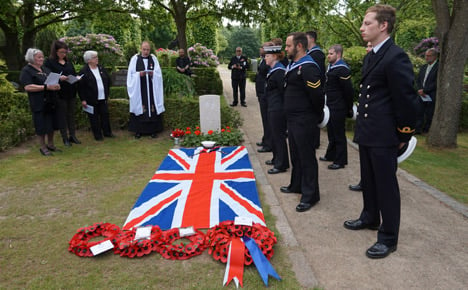Moving ceremony this morning in Esbjerg for the re-dedication of the grave of Able Seaman Harry Gasson #Jutland100 pic.twitter.com/q18wYSeREg
— Vivien Life (@HMAVivienLife) May 31, 2016
WAR
British Battle of Jutland victim honoured 100 years later
Royal Navy Able Seaman Harry Gasson was properly laid to rest in Esbjerg on Tuesday, a full century after being killed in the Battle of Jutland, the biggest naval battle of the First World War.
Published: 1 June 2016 09:18 CEST

AB Gasson's service was attended by relatives (L) and sailors from HMS Tyne (R). Photo: Commonwealth War Graves Commission
Gasson’s body was recovered on the Danish coast near Esbjerg in September that year and buried at Esbjerg New Cemetery with the grave inscription ‘A British Seaman of the Great War’.
After being properly identified by the Commonwealth War Graves Commission (CWGC), AB Gasson was finally given an honourable resting place on Tuesday. The sailor’s grave was re-dedicated with a new headstone that now bears his name at Esbjerg New Cemetery.
AB Gasson’s descendants Barbara Pritchard and Niece Michelle Enrof, both from Toronto, Canada, and his cousin once removed, Maggie Compton from Ludlow in Shropshire, attended Tuesday’s rededication ceremony.
“It was a very emotional day and we are so happy that Harry finally has a named grave. We are extremely grateful to everyone that has worked so hard to make this happen,” Maggie Compton said in a statement provided to The Local.
Also present were representatives from Britain’s Joint Casualty & Compassionate Centre and the CWGC, the UK's Ambassador to Denmark, Vivien Life.
“I am honoured to be in Jutland to mark such a historic day with such a moving ceremony. This was a very personal story of one sailor who gave his life, but which represents the many who were lost one hundred years ago,” Commodore Ian Bisson of the Royal Navy said.
A memorial sculpture park for the victims of the Battle of Jutland is due to open in the northern Jutland town of Thyborøn later this month.
More than 6,000 British and 2,500 German sailors were killed in the 36-hour battle, which began off the Danish coast on May 31, 1916. More than 100,000 sailors were engaged in 250 ships.
Url copied to clipboard!


 Please whitelist us to continue reading.
Please whitelist us to continue reading.
Member comments